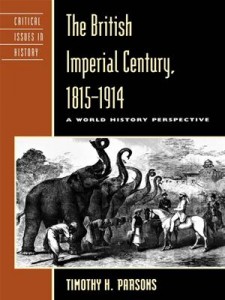Although Britain's overseas empire may not have been "acquired in a fit of absence of mind," as one of its most prominent historians once alleged, neither was it the brainchild of politicians and bureaucrats in London. Why, then, has so much imperial history been written from this metropolitan perspective? Timothy Parsons strongly contends that the scope and duration of this, the largest of all modern European empires, can only be understood from a non-Western perspective. In an exceptionally concise and informative fashion, The British Imperial Century offers its readers a comprehensive overview of the formation and administration of the empire from its origins in the early nineteenth century, to its climax at mid-century, to its denouement on the eve of the First World War. This was the era in which a previously "informal" empire based on trade and commerce was transformed into a "formal" empire in which trade was often of secondary importance to strategic or political considerations. Parsons devotes chapters to key colonies and regions, many of them overlooked by previous scholars, that include the Indian "raj," Africa, the Middle East, and China. He also considers the long-term consequences of imperialism on the cultures of the colonized and the colonizers alike. An ambitious and thoughtful contribution to the field of imperial history, The British Imperial Century will find a useful place in courses on world history and European history, or as a supplemental text for classes on African, Asian, British, or Middle Eastern history.
British imperial century, 18151914, the
Sobre
Talvez você seja redirecionado para outro site












